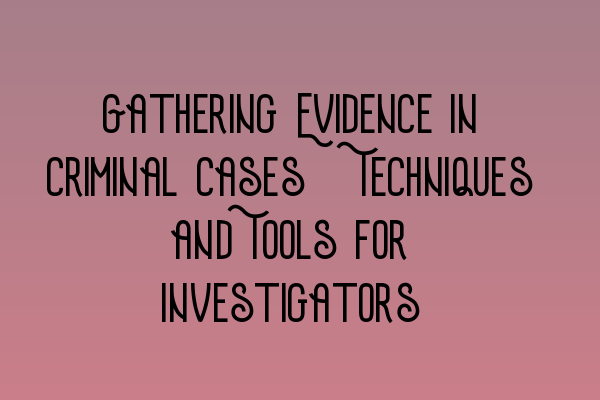Gathering Evidence in Criminal Cases: Techniques and Tools for Investigators
As a criminal defense or prosecution attorney, your ability to gather and analyze evidence is crucial in order to build a strong case. In this article, we will discuss various techniques and tools that investigators can use to gather evidence effectively in criminal cases.
1. Surveillance
Surveillance is an essential technique used by investigators to gather evidence in criminal cases. It involves discreetly observing and documenting the activities of a suspect. This can be done through physical surveillance or by using modern tools such as GPS trackers or hidden cameras. By collecting visual or audio evidence, investigators can uncover vital information that can make or break a case.
2. Forensic Analysis
Forensic analysis plays a crucial role in gathering evidence in criminal cases. Investigators can collect physical evidence such as fingerprints, DNA samples, or ballistic data at crime scenes. This evidence can be analyzed by forensic experts to establish links, identify suspects, and ultimately provide solid proof in court. Utilizing the services of a reputable forensic analysis laboratory can greatly enhance the strength of your case.
3. Digital Forensics
In today’s digital age, a significant amount of evidence is stored electronically. Digital forensics involves the analysis of electronic devices such as computers, smartphones, or hard drives to recover and examine relevant data. Investigators can extract emails, text messages, social media posts, or deleted files that can provide critical evidence in criminal cases. It is essential to stay updated with the latest digital forensics tools and techniques to effectively gather and present digital evidence in court.
4. Witness Interviews
Interviewing witnesses is a fundamental technique for gathering evidence in criminal cases. Investigators need to conduct thorough and strategic interviews to extract relevant information and testimonies. Building rapport, asking open-ended questions, and actively listening to the responses can help uncover key details that can support the case. It is important to ensure the credibility and reliability of witnesses through background checks and corroboration with other evidence.
5. Expert Witnesses
In complex criminal cases, expert witnesses can provide invaluable evidence and analysis. They possess specialized knowledge and skills in specific fields such as forensics, psychology, or medical sciences. Expert witnesses can assist in interpreting complex evidence, reconstructing crime scenes, or providing professional opinions related to the case. Collaborating with expert witnesses can significantly strengthen the evidentiary value of your case.
Conclusion
Gathering evidence is a critical aspect of criminal cases, as it forms the foundation upon which legal arguments are built. By utilizing techniques such as surveillance, forensic analysis, digital forensics, witness interviews, and expert witnesses, investigators can collect compelling evidence to support their cases. It is vital to keep up with advancements in investigative tools and techniques in order to stay ahead in the ever-evolving legal landscape.
For more information on the SQE criminal law and practice, visit the following related articles:
- SQE 1 Practice Exam Questions
- SQE 1 Practice Mocks FLK1 FLK2
- SQE 2 Preparation Courses
- SQE 1 Preparation Courses
- SRA SQE Exam Dates
